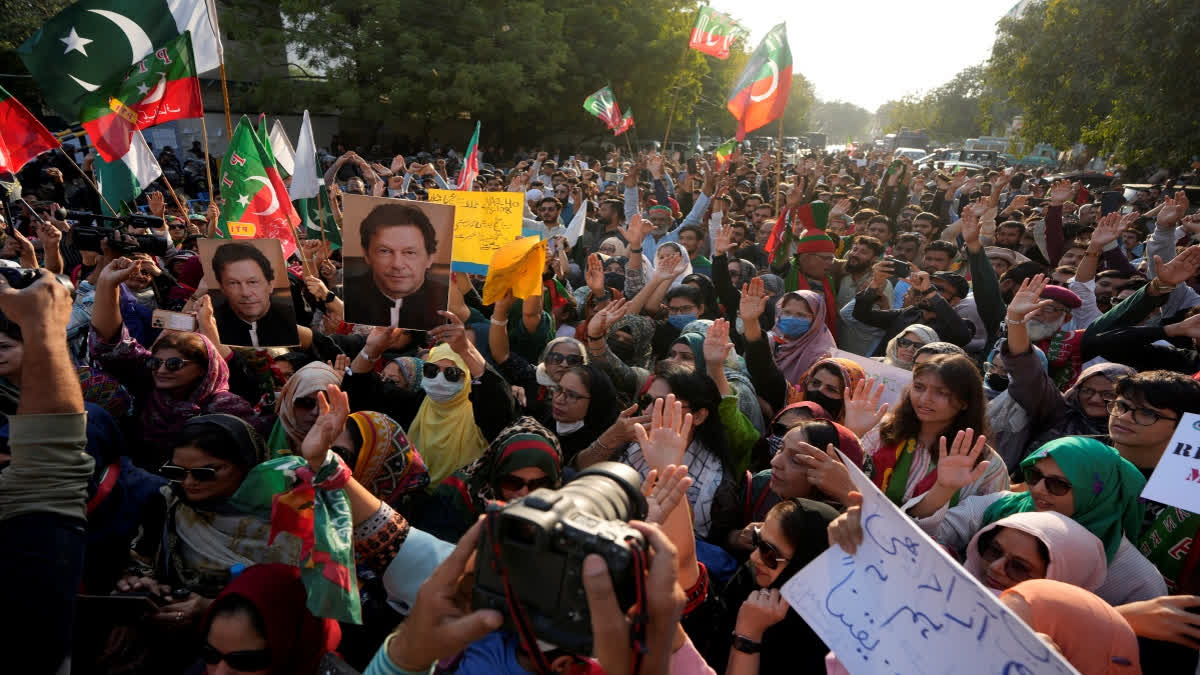Islamabad/Lahore:The three main political parties in Pakistan on Sunday intensified their efforts for the formation of a coalition government after it became clear that the coup-prone country faced a hung Parliament post general elections marred by allegations of rigging.
The general elections were held on Thursday, but the unusual delay in the announcement of results vitiated the atmosphere as several parties cried foul and some resorted to protests. Former prime minister and the Pakistan Muslim League-Nawaz supremo Nawaz Sharif received the backing of the powerful Pakistan Army chief General Asim Munir on Saturday for his call for a unity government to pull Pakistan out of its current difficulties.
Amidst allegations of vote rigging and inordinate delay in announcing the results, the Election Commission of Pakistan (ECP) on Sunday published the results of 264 out of 265 contested seats in the 266-member National Assembly. The result of one constituency was withheld by the ECP due to complaints of fraud. Election to one seat was postponed after the death of a candidate.
Independent candidates, a vast majority of them backed by jailed former prime minister Imran Khan's Pakistan Tehreek-e-Insaf (PTI), won 101 seats in the National Assembly. They were followed by three-time former Sharif's Pakistan Muslim League-Nawaz (PML-N) with 75 seats, which technically is the single largest party in Parliament. The Pakistan Peoples Party of Bilawal Zardari Bhutto got 54 seats, and the Karachi-based Muttahida Qaumi Movement Pakistan (MQM-P) of Urdu-speaking people who migrated from India during the Partition, got 17 seats. Other smaller parties won the rest of the 12 seats.
To form a government, a party must win 133 seats out of 265 contested seats in the National Assembly. Overall, 169 seats are needed to secure a simple majority out of its total 336 seats, which include the reserved slots for women and minorities which will be decided later based on proportional representation. The PML-N was leading the push to form the coalition government on the pattern of one it set up after Khan, 71, was removed as prime minister through a no-confidence vote in April 2022. Party supremo Sharif, 74, tasked his younger brother former premier Shehbaz Sharif to hold talks on the issue.
The PML-N leaders on Sunday held a meeting with MQM-P leaders in Lahore. After an hour-long meeting, they have reached a principle agreement to work together in the upcoming government, according to a statement released by Sharif's party. We will work together in the interest of the country and public, the statement said, adding that basic points had been agreed upon by the two parties.
MQM-P leader Haider Rizvi earlier told Geo News in an interview that his party would be more comfortable with the PML-N as the two parties don't compete in Karachi unlike the PPP or other parties. PML-N President Shehbaz on Saturday met senior PPP leaders Asif Ali Zardari and his Bilawal on Friday night and discussed the future coalition. Shehbaz told the party leaders that former president and PPP leader Asif Zardari has demanded the prime minister's slot for PPP Chairman Bilawal and major ministerial portfolios in exchange for support for the PML-N to form the government, sources said.
Party sources added that so far making a coalition with Zardari was the first option the PML-N was exploring but didn't want to give away the slot of prime minister. Sources claimed the meeting decided that in case the negotiations with the PPP failed, the PML-N would make a coalition government with MQM, JUI-F and other smaller parties, including independents. They further claimed that in this scenario, the PML-N would make Shehbaz Sharif the prime minister and Maryam Sharif the Chief Minister of Punjab.
"Shehbaz Sharif is the favourite for the PM office for being more close to the military establishment besides the PML-N has more seats in Parliament than the PPP," sources said. "Shehbaz is a favourite of the military establishment which feels much comfortable working with him," they said. Meanwhile, Bilawal, the 35-year-old former foreign minister said no one could form governments in the Centre, Punjab or Balochistan without his party's support, and the PPP's door was open to every political party for dialogue, as reconciliation was vital for political stability.
So far, the PPP has not engaged officially with the PML-N, PTI or any other party. Once the results are finalised, then the Central Executive Committee of the party, which nominated me as the candidate, will sit again and devise the course of action, he said. It is believed that a newer version of the Pakistan Democratic Movement coalition, also called as PDM government, under Shehbaz Sharif was more likely based on the experience of running the government after Khan was removed.
